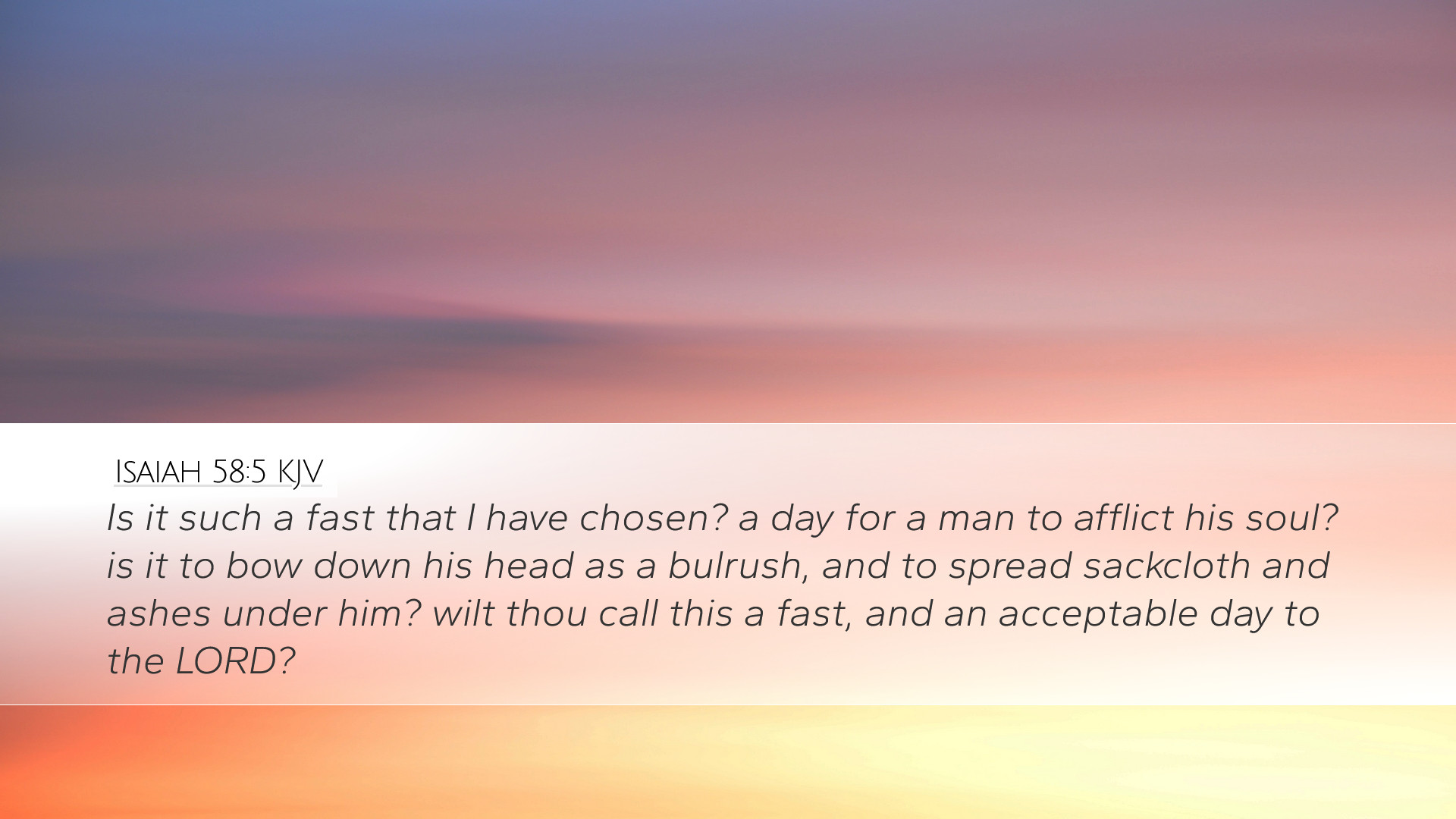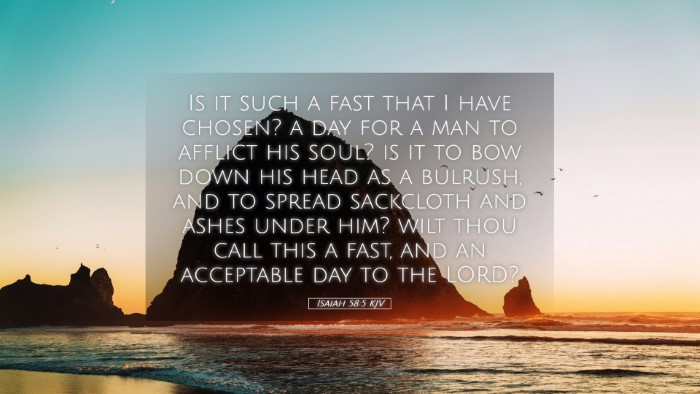Isaiah 58:5 Commentary
Verse: "Is this the fast that I have chosen? a day for a man to afflict his soul? is it to bow down his head as a bulrush, and to spread sackcloth and ashes under him? wilt thou call this a fast, and an acceptable day to the Lord?" (Isaiah 58:5)
Introduction
The context of Isaiah 58 is a scathing critique of the superficial religion practiced by the Israelites. The Lord, through the prophet Isaiah, addresses the hypocrisy of fasting without sincere heart engagement. Within this verse, the limitations of mere ritualistic observance are revealed, urging a deeper, more genuine expression of devotion to God.
Analysis of the Text
This verse questions the authenticity and purpose of the fast observed by the people. The rhetorical questions posed by God highlight a disconnect between the outward observance of fasting and the intended spiritual result that should accompany it.
Key Themes
- The Purpose of Fasting: The passage emphasizes that the fasting rituals must align with God's purposes, aimed at humility and repentance rather than mere tradition.
- God's Displeasure with Ritualism: God challenges the idea that physical acts of mourning and abasement are adequate substitutes for true contrition and ethical behavior.
- The Call for True Righteousness: This verse sets the stage for a broader call to active compassion and justice in the lives of believers.
Public Domain Commentary Insights
Matthew Henry's Commentary
Henry highlights that the fast the Lord has chosen is a matter of the heart rather than mere outward appearance. He elaborates that the Israelites believed their external actions, such as afflicting their souls and displaying signs of mourning (like sackcloth and ashes), were sufficient for God's approval. However, Henry argues that God requires much more—specifically, an inner transformation that reflects love for others and justice.
Albert Barnes' Notes on the Bible
Barnes points out that God does not reject fasting in itself but is critical of the kind of fasting that lacks sincerity. He underscores that the true fast that is pleasing to God goes beyond avoiding food; it includes caring for the needy and embodying social justice. Barnes asserts that the essence of fasting must be to draw closer to God and to reflect His attributes in one's life.
Adam Clarke's Commentary
Clarke discusses the significance of "afflicting the soul" in the context of fasting. He argues that although these expressions can symbolize penitence, they must be matched by a genuine desire to turn from sin and engage in acts of kindness and mercy. Clarke warns against relying on rituals as a substitute for a living faith and integrity. He suggests that acceptable worship must integrate both personal humility and social responsibility.
Theological Reflections
Isaiah 58:5 challenges contemporary faith communities to reflect on their practices and the motivations behind them. It invites a re-examination of what it means to fast and to worship God authentically:
- Authentic Worship: Worship must engage the whole person—mind, heart, and actions.
- Integration of Faith and Action: Genuine faith should inform our ethical treatment of others, especially the marginalized.
- Heart of Obedience: God desires obedience from the heart, not merely compliance with rituals.
Application for Pastors and Leaders
This verse and its commentary have profound implications for pastors and church leaders:
- Encourage Genuine Fasting: Foster an understanding of fasting that leads to personal and communal transformation.
- Promote Compassionate Action: Challenge congregations to extend their fasts into acts of service and justice in their communities.
- Guard Against Hypocrisy: Regularly preach against the danger of ritualism devoid of heart-felt sincerity.
Conclusion
Isaiah 58:5 serves as a powerful reminder that worship is not merely an external observance but an internal reality that must reflect in our daily lives. As believers strive for authenticity in their relationship with God, they are called to understand that true worship manifests itself in acts of love, justice, and mercy towards others. The insights from commentators deepen our understanding and challenge us to align our practices with the heart and character of God.


